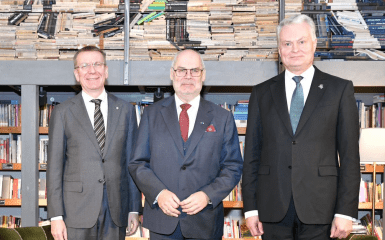The Presidents of Estonia, Latvia and Lithuania Alar Karis, Edgars Rinkevičs and Gitanas Nauseda made a joint statement on the occasion of the 20th anniversary of the accession of the Baltic States to the European Union. They called on the bloc to start negotiations on the accession of Ukraine.
Statement of Baltic presidents regarding starting negotiations about Ukraine's accession to the EU
A statement published on the Estonian President's website emphasises the importance of EU membership for the three countries' welfare, security, and economic growth.
They also believe that negotiations on Ukraine and Moldova's accession to the EU should start in June.
In 1990-1991, democratic choice was put to the test in the Baltic States. Currently, Ukrainians, Moldovans and Georgians are fighting for European values and the European family as their final choice. We firmly stand in support of those countries that share European values and the will to be together, the statement reads.
The heads of Estonia, Latvia, and Lithuania called on the European Union to start negotiations to join the bloc with Ukraine and Moldova.
The Baltic States are a great example of how EU membership stimulates modernisation and economic progress. This is our reality, which we want to share, added the presidents of the three states.
Accession of Ukraine to the EU: what is known
In June 2022, the European Council granted Ukraine the status of a candidate for the EU. For further steps, Ukraine should implement the following reforms:
reform of the Constitutional Court;
continuation of judicial reform;
anti-corruption, appointment of the head of the Special Anti-Corruption Prosecutor's Office;
countering money laundering;
implementation of the anti-oligarchic law;
harmonisation of audiovisual legislation with European legislation;
change in legislation on national minorities.
In November 2023, the European Commission recommended that the Eurocouncil start negotiations on Ukraine and Moldova's accession.
In March 2024, the European Commission prepared a negotiating framework for the membership of Ukraine and Moldova.









